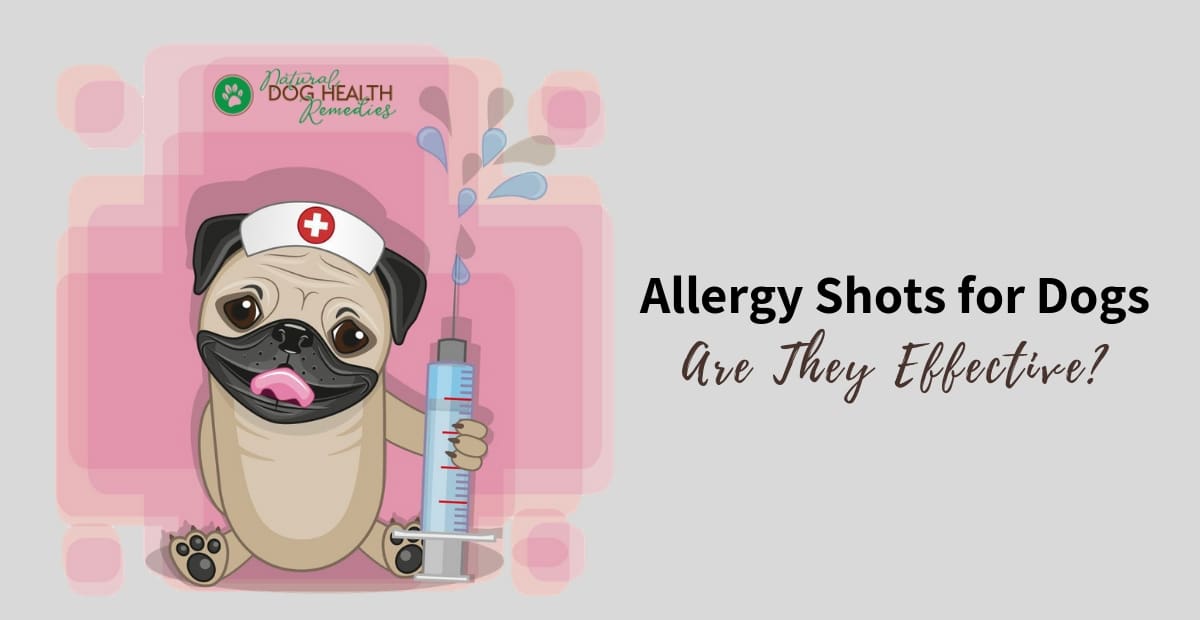Allergy Shots for Dogs

Overview
Immunotherapy (aka hyposensitization, commonly called "allergy shots") is a type of conventional dog allergy medication which is sometimes used as a "last resort".
Allergy shots are recommended to dogs who do not respond to any other conventional allergy therapies such as corticosteroids (e.g. Prednisone) or antihistamines (e.g. Benadryl).
Allergy shots involve injecting the dog with antigens weekly. (Antigens are foreign proteins to which a particular dog has shown allergic symptoms). The antigen(s) to be injected is determined after intradermal skin testing.
Intradermal Skin Testing
In order to get accurate and valid results from the intradermal skin testing, the dog patient has to be off all types of allergy medications (i.e. antihistamines and corticosteroids) for a period of time (your vet will let you know exactly how long).
During the skin testing, the dog will be tested for possible allergic reactions to a number of substances (altogether about 60 substances are being tested).
Usually, the dog will have to be sedated for the testing.
How Do Allergy Shots Work?
Although the exact mechanism is not clear, we can find several theories.
According to one theory, immunotherapy can reduce IgE levels.
IgE is a special kind of antibodies that attach to mast cells and allergens (foreign proteins). They cause the mast cells to "explode" and release large amounts of chemicals including histamines, which trigger the common allergic reactions in dogs.
According to another theory, with allergy shots, the dog's body will gradually become more tolerant of the foreign proteins. The thinking is, the dog's body may be induced to develop some type of cells that can suppress allergic reactions to the foreign proteins.
As a result, the dog will show fewer and less severe allergy symptoms when he does actually get into contact with the allergen(s).
Why are Allergy Shots Not Commonly Used in Dogs?
Many veterinarians propose to use allergy shots as a last resort to treat dog allergies. There are several reasons for this.
- Time Consuming: One of the main reasons is that the treatment process takes a long time. At least one year is needed to ascertain whether the dog patient is actually responding positively to the allergy shots.
- Not As Effective: Compared to other allergy treatments (such as steroids, antihistamines, etc.), immunotherapy is not as effective. Only about 60-70 percent of dog patients show positive responses to the shots.
- Possible Side Effects: Allergy shots for dogs may potentially cause some adverse effects to the dog patient.
 For example, the dog may actually develop allergic responses to the shots themselves! That is to say, the dog's patient may become allergic to the antigens that have been injected into the body.
For example, the dog may actually develop allergic responses to the shots themselves! That is to say, the dog's patient may become allergic to the antigens that have been injected into the body.
Signs of side effects include skin irritations (e.g. hives, rashes, itching), swelling of the face, nausea and vomiting, diarrhea, and in rare cases, breathing difficulties and collapse.
- Costs: Allergy shots are not cheap! First, for the intradermal skin testing, depending on the clinic, it costs at least $100 or more (including sedation). For the required 12 allergy shots, the cost is approximately $150.
Natural Allergy Remedies
If your dog has allergies, before considering allergy shots, perhaps it is an good idea to give natural remedies a try. Remedies such as herbs, supplements, etc. can be used to alleviate allergy symptoms in dogs and boost the dog's immune system.
Check out our page on Natural Alergy Relief for Dogs for more information.

M. Goldstein, The Nature of Animal Healing (Ballantine Books, 2000).
S. Messonnier, The Allergy Solution for Dogs (Three Rivers Press, 2000).
R.H. Pitcairn, The Complete Guide to Natural Health for Dogs and Cats (Rodale, 2005).





